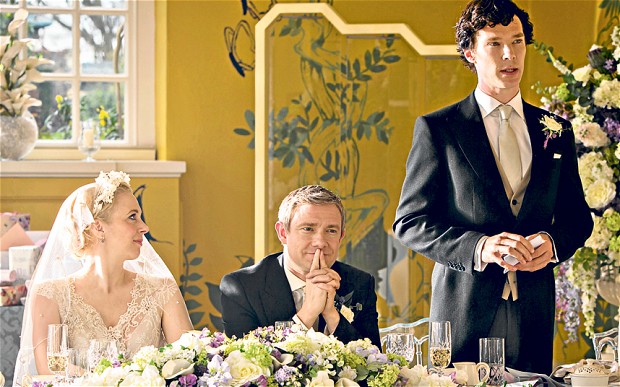Review: Battle of Five Armies

Spoiler Alert….
With Smaug’s fiery destruction ended relatively swiftly, the majority of Battle of Five Armies is dedicated to character development, the titular battle and paving the way for the plot of Lord of the Rings.
The latest, and final, instalment of the Hobbit franchise requires quite an extensive suspension of belief even for the fantasy genre. Tolkien’s world is one of magical rings, gravity-defying elves and, in the Hobbit’s case, excessively CGI-d orcs, but Lord of the Rings always had a touch of realism to it. This may be in part due to the sweeping sets, from the halls of Gondor to the interior of Mount Doom, the sets added to an almost overwhelming sense of realism. But the idea of the, in comparison, limited armies of Thandriul even combined with the dwarf, human and eagle forces, defeating the expansive army of orcs, reached beyond the boundaries of fantasy believability. Watching the dwarves retreating and on the point of extinction made it difficult for me to believe a measly eight more would make a difference. Granted, they’re proven skilled fighters, and Thorin proves a rallying point, but the crane shot that showed the differences in numbers made me believe the demise of at least a significant portion of the dwarf army inevitable. On a quick, pedantic note: two dwarves fighting a hundred goblins with apparent ease, not sustaining even a shred in their clothing? This made it difficult for me to believe any situation would be perilous to this apparently immortal race. (Yes, I was quickly proven wrong.)
Another issue I had with this film is one I had in regards to Lord of the Rings: the eagles are essentially a deus ex machina, a plot device. What perplexed me was; why didn’t the eagles return Gandalf and Bilbo to the Shire? It took a considerable amount of time to reach the Mountain, and the trip was shown to be one of perilous danger in the first two instalments. Regardless of this, hearing the Eagles are coming, previously used in Return of the King as a symbol of hope and salvation, turned into a sign of helplessness and despair, was particularly harrowing, and I applaud the script-writers for this subversion.
The ending left me somewhat unsatisfied also, with more than a few lingering questions. What happens to the contents of the Mountain? Does Bard become Master of the town? Was Tauriel unbanished? Peter Jackson seems to have gone down the polar opposite route of Return of the King with it’s multiple endings that, despite dragging the already long running time, leave you with the satisfaction of knowing the outcome for most of the characters. I did however, enjoy the final scene, which effectively linked the Hobbit series with Lord of the Rings.
The above criticisms are not to say I didn’t enjoy the movie; Battle of Five Armies ties in with An Unexpected Journey for my favourite of the Hobbit franchise. The battle scenes were up to their usual Peter Jackson standards, and, for someone who’s never read the novel, filled with tension about what the outcome would be. The acting also was spectacular. Ian McKellen and Martin Freeman were stellar as expected, the latter’s performance of denial and grief was particularly stellar. The stand out actor for me was Richard Armitage however. Armitage pulls off Thorin’s broody, vengeful persona effectively, but his performance during Battle of Five Armies, particularly the effects of dragon sickness was unsettling, his demise and reconciliation with Bilbo evocative.
Despite it’s flaws, Five Armies definitely exceeded my expectations after the disappointment of the bloated Desolation of Smaug, and contains stunning performances from it’s standout cast. I’d describe the movie as more of a popcorn flick, an enjoyable way to kill a few hours with some remarkable action scenes interlaced with, questionably timed, comedic moments.
Grade: B-
10 Great Terry Pratchett Quotations on His Birthday
Since today is the birthday of Sir Terence David John Pratchett, better known to the world as Discworld author Terry Pratchett (Happy Birthday, Sir Terry!), we’ve compiled a list of our favourite one-liners and wise remarks from the master of comic fantasy.
‘Stories of imagination tend to upset those without one.’
– Foreword to The Ultimate Encyclopedia of Fantasy (1998) by David Pringle
‘A marriage is always made up of two people who are prepared to swear that only the other one snores.’
– The Fifth Elephant
‘When I was a child I read books far too old for me and sometimes far too young for me. Every reading child is different. Introduce them to the love of reading, show them the way to the library and let them get on with it. The space between the young reader’s eyeballs and the printed page is a holy place and officialdom…
View original post 159 more words
Margie-Rule # 1: Never Take Any Word for Granted
 By Margie Lawson
By Margie LawsonA big THANK YOU to Laura Drake and Fae Rowen for inviting me on WITS , and hugs to Sharla for loading it on the blog.
Do you watch NCIS?
I love giving my brain a weekly dose of NCIS. Millions of others love the show too. The stories are intriguing. The characters are deep and quirky. And Jethro Gibbs, aka Mark Harmon, has rules.
Gibbs has lots of rules. Over 50 rules.
I’m spinning-off Margie-Rules from Gibbs’ rules. My next fifteen (or fifty) blogs will feature a different Margie-Rule.
I appreciate the NCIS writers for their award-winning writing, and for giving Gibbs rules.
Gibbs’ Rule # 8: Never take anything for granted.
Today’s Blog: Margie-Rule #1: Never Take Any Word for Granted.
Writers like words. Writers like how words sound, how they look, how they roll. They select words for their connotations, their subliminal messages, their power…
View original post 1,356 more words
Five Fascinating Facts about The Hunger Games
1. The idea for The Hunger Games came to author Suzanne Collins while channel-hopping between coverage of the invasion of Iraq and a reality TV show. The idea began to form in her mind of a narrative which concerned a televised fight to the death. The theme of the series has led critics to draw comparisons with similar works, principally Battle Royale, a 1999 novel by Japanese author Koushun Takami, but the idea of a dystopian future world in which people fight each other as part of a television programme is found in a novel by Stephen King (writing as Richard Bachman), The Running Man (1982).
2. The author of The Hunger Games, Suzanne Collins, was one of the writers on the 1990s teen TV show Clarissa Explains It All. Collins worked in television for many years during the 1990s; her other television writing credits included Clifford’s Puppy…
View original post 296 more words
#Disappointed
Completely agree Vic- this season has felt like fan-service so far, although hopefully the last episode will compensate. Elementary has my recommendations, which is quickly becoming one of my favourite TV shows.
It would appear that television and I are having a mild disagreement at present. I had abandoned the screen for quite a while last year. It bores me. That is not to say that good programming is inexistent, but it is a rarity. Plus. One has to be in the mood.
There was one particular show, however, that I hoped might resolve matters and make me fall in love with that dream-peddling box once again. Sherlock.
You will not believe how much will power it took not to write about it after viewing The Empty Hearse. It drained me of the little energy that the holidays had left behind.
Why did I say nothing on the 1st of January? Because I have been told to keep quiet unless I have something nice to say. So… I have been trying to think of something nice to say. All that kept cropping…
View original post 360 more words
Five Fascinating Facts about J. R. R. Tolkien
Tolkien was born on this day in 1892. In honour of the anniversary of his birth, we’re launching a new series, ‘Five Fascinating Facts’, which will be a regular feature on this blog over the coming months. Fans of our blog may have followed our recent series, ‘Five Reasons’, featuring articles on lesser-known writers such as George Meredith, Sir Edward Bulwer-Lytton, Ernest Dowson, and George du Maurier.
View original post 603 more words
Rule Breaking | Rejection Pile
How do you feel about rules on writing? I know. I used to feel the same way. Surely to create art requires freedom – not the straightjacket of rules? The greats have put no store by rules, and in breaking the rules, they were able to create works of art that have survived them and are here today for us to delight in. This I believe still. However…
 In order to break rules, it is best to know first what rules we are breaking. Why?
In order to break rules, it is best to know first what rules we are breaking. Why?
Because there are no rules to great writing, but as we start on this journey to becoming better versions of ourselves, knowing the rules will help us avoid falling into some fairly obvious “bad writing” traps.
Knowing what not to do sometimes is more useful than knowing the opposite. And whereas talent can’t be learnt, craft can.
Here is the first thing I learnt.
Picture…
View original post 310 more words
The Twelve Best Facts from a Year of Interesting Literature
By Dr Oliver Tearle (Loughborough University)
Here at Interesting Literature we’re celebrating our one-year anniversary this weekend. With that in mind, we wanted to offer the twelve most interesting facts that we’ve uncovered over the last year – one for each month we’ve been up and running – and as a present for all of you who read our posts and interact with what we write. (Consider what follows an early Christmas present!) So, here goes:
View original post 894 more words
The Dog Park – First Draft
The Many Scribbles of Gaelan Hamilton
Just finished it there so I thought I’d pop it up before I go out tonight 🙂 Enjoy!
A plethora of steadfast wooden soldiers
Wrapped in nature’s leafy emerald mantle
Watch as tamed beasts march on by with their owners
Oh so obedient; never at battle.
The multitude of cascading scents grip them;
Tearing their dedication away briefly
And plunging them back into feral mayhem.
But with a word they return from far away.
Friendly exchanges are passed between strangers,
Their companion their only affinity
Yet they smile and they wave and they can snigger
For this is their place; their own community.
How many people have walked these very paths?
The collection of souls linked by common cause;
Can they sense each other through time’s endless depths?
Or do they walk on with no reason to pause?
All leave their mark; the roads are never…
View original post 61 more words



